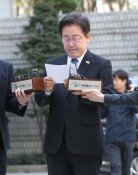21st National Assembly should open the door for governance in a true sense
21st National Assembly should open the door for governance in a true sense
Posted May. 30, 2020 08:25,
Updated May. 30, 2020 08:25
The 21st National Assembly of South Korea will begin its term from today. Unlike the 20th National Assembly, which was launched with less ruling party members than opposition party members four years ago, the new assembly features a completely different landscape with 177 seats held by the ruling party. The Democratic Party of Korea suggested electing the speaker and deputy speaker of the National Assembly by June 5 and the chairpersons of the standing committees by June 8 in accordance with the National Assembly Act, however, the United Future Party is insisting on holding such elections until after finishing the negotiations on parliament formation.
The negotiations on parliament formation will be the first testbed for governance between the ruling and opposition parties. However, the negotiations are already having issues in the beginning. As the ruling party is demanding the chairperson positions of the Legislation and Judiciary Committee and the Special Committee on Budget and Accounts based on the party’s dominant number of seats, the opposition party is pushing back. The ruling party remains uncompromising, even considering the possibility to take all 18 chairperson positions of the standing committees. Of course, such a hardline attitude seems to be a preemptive bargaining chip, but the first bipartisan negotiations of the 21st National Assembly should not be driven to failure. When the current ruling party held 127 seats as the opposition party at the beginning of the 19th National Assembly eight years ago, the standing committee chairperson positions were divided based on the negotiations with the then-ruling party.
If the ruling party falls into the temptation of power politics, the precedence of the 20th National Assembly may be repeated with governance missing and the “politics of number” overpowering. The forceful passage of the election bill and the bill for investigative powers reform led by the “4+1” consultative body across the ruling side without involving the main opposition party at the end of the 20th National Assembly was an example of undermining the basic principles of the deliberative democracy. If such power politics are repeated, the latter part of the Moon Jae-in administration will struggle with division in public sentiment. The opposition party should also adopt a responsible attitude of engaging policy competitions by proposing alternatives, rather than simply opposing the ruling party. Both parties should not forget that the National Assembly’s abandonment of negotiation-based politics will degrade the authorities of the legislative body.
There are 151 newly-elected members in total across both the ruling and opposition sides among over 300 members of the National Assembly, which means the foundation for new politics free of certain factions and outdated ideologies has been formed. The newly-elected members should lead new movements in political reforms. The functions of the legislative body to hold the administration in check should be reinforced while the old, authoritative, and inefficient practices, such as raising one’s voice and calling an excessive number of witnesses at National Assembly inspections, should be removed. Furthermore, the idea to rely on immunity from arrest and exemption from obligation should not be held while letting go of the privileges given to National Assembly members as the public wants should be encouraged. Parties should learn from the experience of the 20th National Assembly – an arguably the worst National Assembly in history – and open the door for new politics to restore the public’s trust in the National Assembly.







